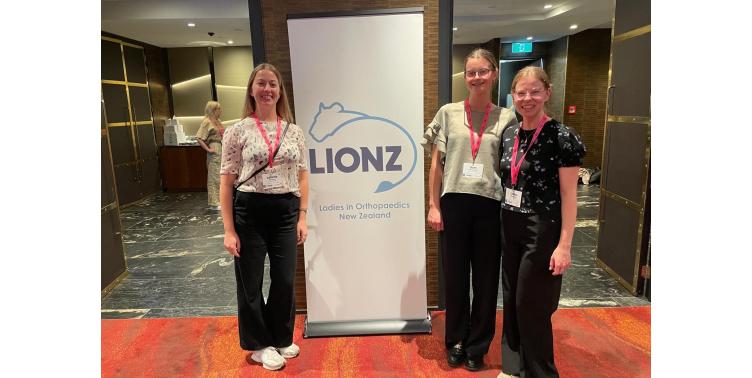The weekend I spent in Auckland for the LIONZ forum was incredible and inspiring, despite my initial feelings of being an impostor. I am only a 5th year medical student, with no real orthopaedic training and I’ve just recently considered orthopaedics as a potential career. Looking back, this idea may have been brewing for some time.
Getting To Medical School
Growing up, both of my parents were excellent role models for me in the orthopaedic field – one a surgeon, the other a theatre assistant. My weekends were spent running around hospital wards being the ‘little helper’ on post-op ward rounds. I kept asking Dad if I could come along to these for much longer than any of my other siblings. Maybe that eagerness was the first sign of things to come.
Everything changed for me at 14 when I was diagnosed with scoliosis. I had my spinal fusion at 15, which significantly changed my physical capabilities. I can no longer lift heavy things, play sports or dance at the level I used to. I’ve had to make adaptations in my life and learn how to ask for help for tasks that most 22-year-olds don’t even have to think twice about. I’ve been fascinated by spines ever since: their mechanics and their problems. I’ve always tried to understand my aches and pains, postulating ideas for what could be wrong and coming up with completely unfounded solutions that are neither practical nor even exist.
Despite my significant exposure to orthopaedics growing up, I couldn’t see myself in this area.
Don’t get me wrong, I was always that weird kid who wanted to be a surgeon, even when other little girls said they wanted to be princesses or fairies when they grew up. I still want to be a surgeon, but until lately, I didn’t fit in with what I believed orthopaedics was. I’m not a man, I’m not strong, and I don’t own R. M. Williams Boots. Combine this with my physical limitations it’s like I’m not even allowing myself to try.
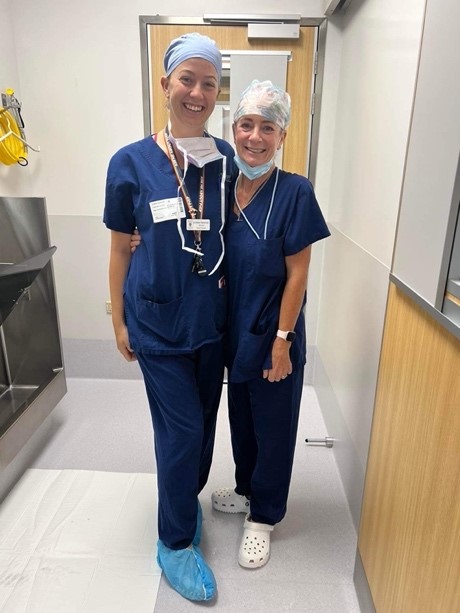
My first rotation in my 5th year of med school was 8 weeks of orthopaedic surgery. I was excited to return to university after a long summer break while getting a small insight into what my parents spent their whole lives doing. My time in the operating theatre was always a highlight, being able to take part in everything from knee replacements to plating acute fractures. I even ran into my mum in theatre one day, how cool!
About halfway through the run, I had a pivotal experience. I walked into the morning acutes list and was surrounded by women. EVERY single member of that theatre team was female, including the patient! I even spotted some very bright pink lanyards, and made a mental note to ask where I could get one of those after the case! The team pulled off a gnarly tibial fracture repair like a well-oiled machine. I felt so involved in the operation and represented by the women working in front of me; it began to change my entire perspective on the specialty. Maybe orthopaedic surgery was something I could do after all? Maybe my stereotypes and narrow perspective weren’t quite right?
I’d heard about the LIONZ forum by this point in the rotation, but I was scared to put my name forward for it. I didn’t know anyone else thinking of attending, and I was worried that people would only think I was going because of family ties to the specialty, not because it was a career I was actually interested in. While sitting next to one of my colleagues in a lecture, we found out that we were both experiencing the same fear so decided to put our names forward at the same time, and the rest was history!
The best news came a few weeks before the forum, that LifeHealthcare had offered to sponsor me for the weekend. I cannot thank them enough for the opportunity they gave me!
At The Forum
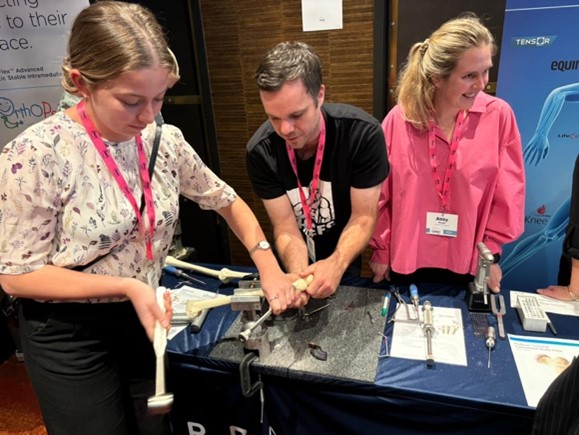
When I stepped out of the elevator at the beautiful SO Hotel, I was overwhelmed. In front of me was a room full of females, all here because of a love for orthopaedics. I was recently told that only 5-6% of orthopaedic consultants in NZ are female, but in a few years, I doubt this will still be the case looking at the number of up-and-coming women before me.
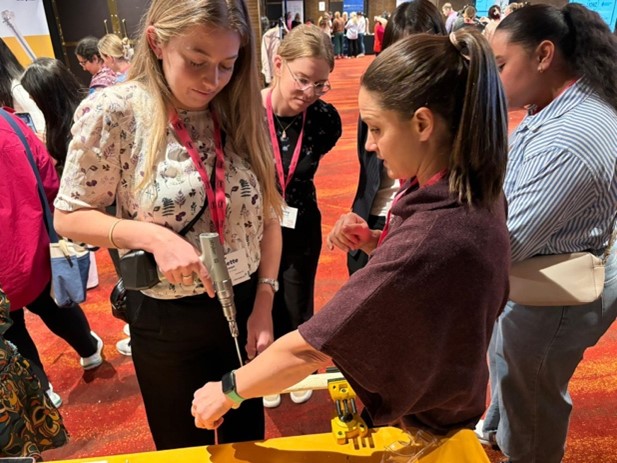
Trying to drill through a tibia with my eyes closed!
The morning was a ‘Sawbones’ workshop, with stations set up for us to rotate around to simulate everything from knee and shoulder arthroscopies to compression plates and lag screws for fractures. I was blown away by the variety of equipment available, and the knowledge that surgeons must have to know exactly which piece to use for each part of the operation. There is so much problem-solving and decision-making on the go, one operation is nothing like the next as all decisions are personalised to each patient. It was awesome to be so hands-on for the whole morning, as this is one of the things I love about orthopaedics!
The afternoon was filled with talks from inspirational experts in their fields. Michelle Dickinson, the keynote speaker, was my highlight of the weekend. Her talk, ‘Inspiring the next generation – why it matters’, filled me with awe, as well as a smouldering rage at the microaggressions we as women face in STEM careers. It is mind-blowing to think of the things that we believe are normal, yet when you take a step back, are something that we should not stand for. Michelle made me realise that it is our job to change the culture, even if we do not believe we have the power to do so. Other talks focused on professional supervision, occupational exposures in pregnancy for people in orthopaedics, and fertility. The night finished with the gala dinner, where we got a chance to mingle with the amazing women we’d been surrounded by all day. I really valued getting to chat with George and Nikki to tell them how much we loved the conference and how much it meant to us as medical students to be so welcomed at an event like this.
My Take Away Points
I carry 3 key messages from the forum:
I am somebody. While this statement may seem obvious, this was the most poignant point from Michelle’s talk. Her career has been fueled by moments of thinking ‘somebody needs to do something about this’, swiftly followed by ‘oh darn, I am somebody’. We cannot keep waiting for others to make the changes that we want to see in our fields. If you’re thinking there needs to be change, likely, someone else is too, and they’re also waiting for someone else to make the first move! If you notice something that needs to change, what is stopping you from trying to change it yourself? Michelle spoke of the power of starting small, and that even the littlest change can snowball into a massive impact. She has inspired me to go into my communities and find areas in which I can make a difference, no matter how small my actions may be or seem at first.
Comfort zones are meant to be challenged. Change is hard, but creating change is even harder. You cannot accept being comfortable with where you are just because the idea of changing your situation is scary and difficult. This applies both personally and to those who will follow in your footsteps. I was once told that I could get around my limitations with heavy manual work by doing an easier orthopaedic subspecialty, such as paediatrics or hands. I could accept this and know I’d be comfortable with this reality, but ultimately, I know I’ll feel so much more fulfilled if I push myself to the maximum and try to break down the barriers that other people want to limit me with. You may have to work hard to carve the path that you want to follow. In doing so, you’re not only building the career that you want but also creating new opportunities for the generation behind you. It’s important to remember that the work doesn’t stop when you get where you want to go, it is a constant fight to improve diversity and conditions. You owe it to yourself, as well as future generations to keep pushing for progress.
Medicine is NOT life. Being a doctor is everything I have ever wanted. From the early days running around the wards with my dad, I knew medicine would be the career for me. What I have come to learn over the past 5 years of medical school though, is that a career in medicine should not be your entire life — the weekend at the LIONZ Forum only emphasised this further. The talks surrounding fertility made me realise that having a family is possible as a female surgeon. Not only this, but you can still be present as a parent despite the hectic schedule of a surgeon. The other wāhine at the conference showed me that our interests and lives outside of the hospital are what make us interesting, unique, and well-rounded people. Things that you love are important to keep you sane and keep you motivated when the going gets tough (as it undoubtedly will throughout your career).
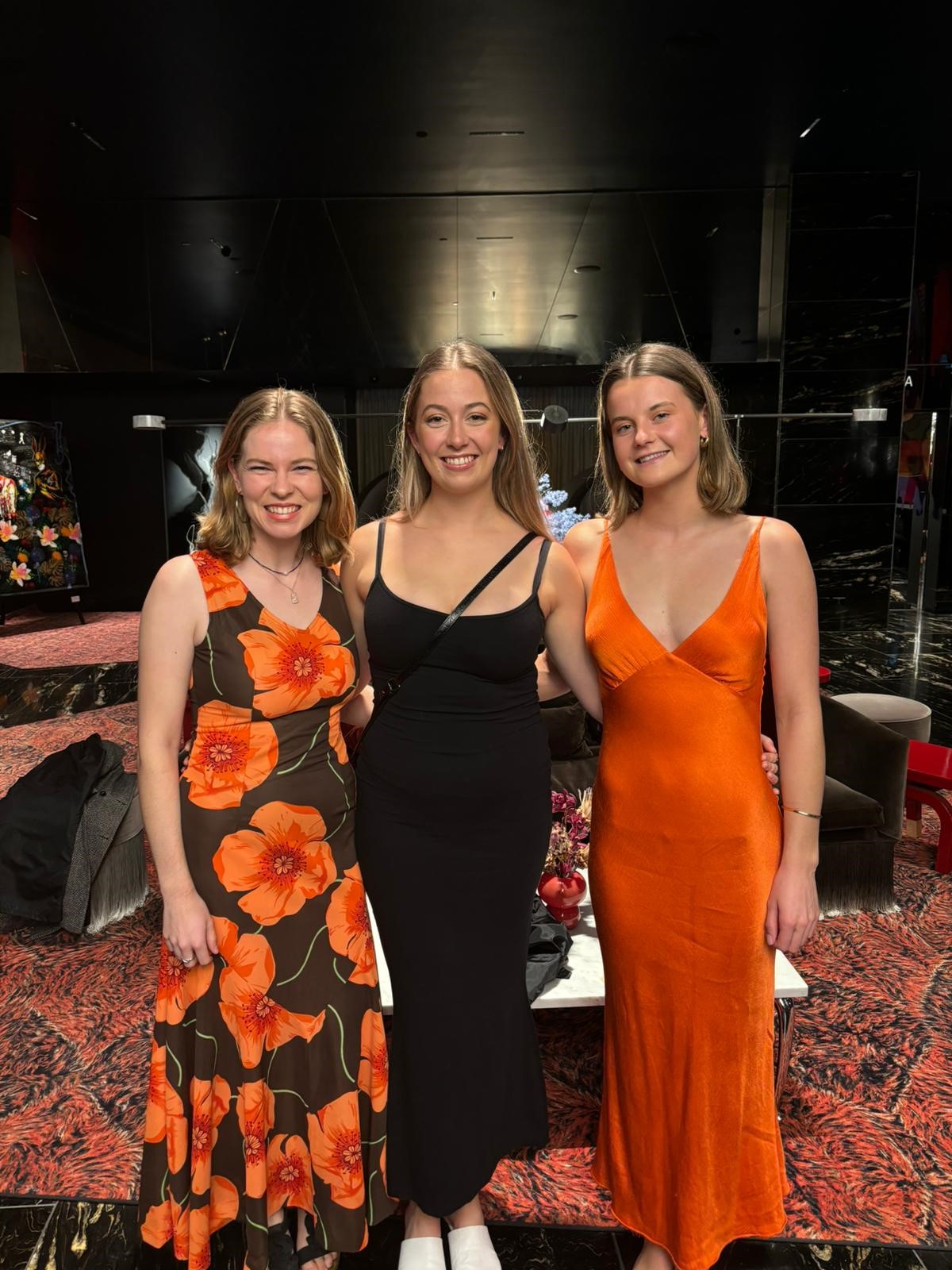
What Next?
I am truly unsure what the future holds for me. First things first - finishing med school! I understand that I have a long way to go before even deciding my future specialty, but the LIONZ Forum absolutely reinforced my interest in orthopaedic surgery as a potential career option, and now the desire is greater than ever! Even if orthopaedics doesn’t end up being for me, the forum was a weekend I won’t be forgetting any time soon. I am grateful for the incredible memories and new relationships forged, as well as the fire in my belly that has been ignited thanks to the inspirational women I met. The points I mentioned above do not solely apply to orthopaedics, and I hope to take my new mentality into whatever area I end up in.
This amazing opportunity would not have been possible without the support of LifeHealthcare and LIONZ. I’m honoured to be one of the three first industry sponsored students for a LIONZ Forum, and I sincerely hope that more students are sponsored in the future to keep the momentum going.
